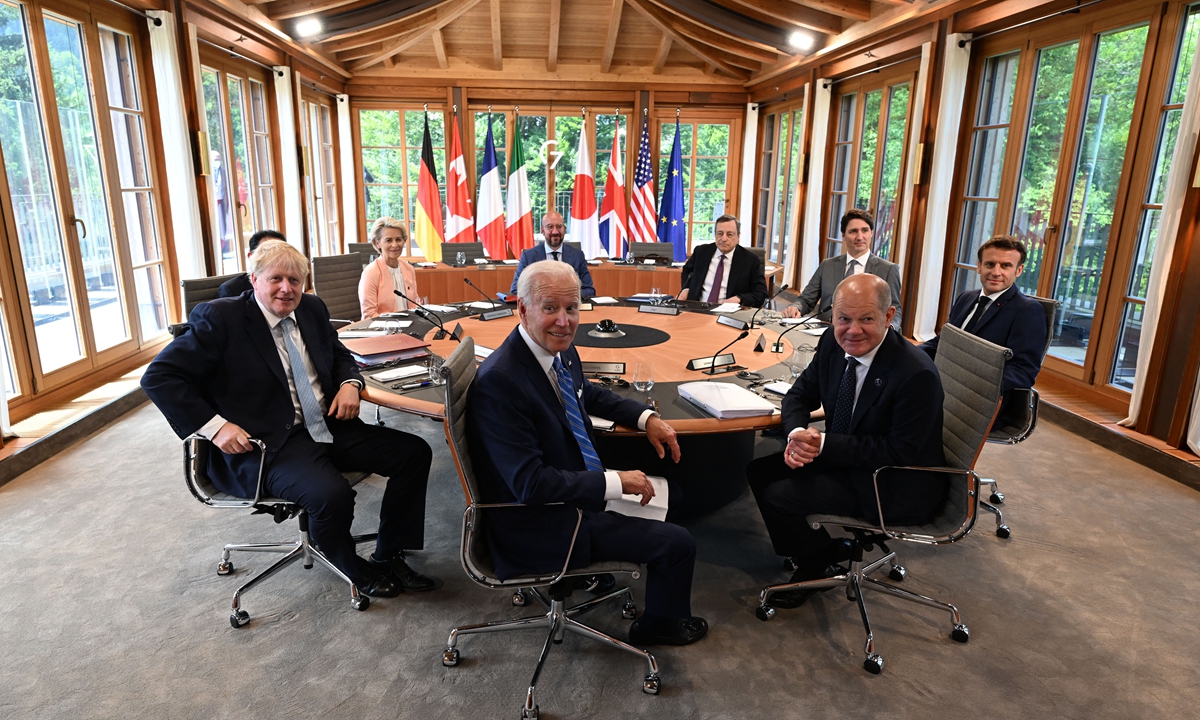
UK Prime Minister Boris Johnson (front left), US President Joe Biden (center) and German Chancellor Olaf Scholz (front right) and other leaders of the G7 sit at a session during the first day of the G7 Summit at Schloss Elmau, Germany, on June 26, 2022. Photo: AFP
The G7 summit kicked off in Bavaria, Germany on Sunday, which will be followed by the NATO summit in Madrid, Spain from Tuesday to Thursday. Some US media said the US is arriving in Europe "with the toughest playbook on how to tackle China."
The specific content of this playbook has become the biggest focus of international public opinion on the two summits. NATO Secretary General Jens Stoltenberg revealed earlier that the bloc will issue a new Strategic Concept during the NATO summit, which will mention the "challenge" from China for the first time.
At a juncture when global issues are becoming more and more prominent, regional crises are emerging one after another, so it is more than a pity that the two highest-level summits of the West view China as a rival, and even as an enemy, when China could have been a crucial partner.
Ironically, it is claimed that both summits will showcase "unprecedented unity." Obviously, that unity is only among some small circles within the West. As for the whole globe, what people hear is the ominous sound of a horn on a "divided world." In other words, the more strength the West puts on the small circles, the larger the geopolitical hostility and military security factors are amplified. The G7 summit will also make statements on global issues such as the COVID-19 pandemic, hunger, poverty, and climate change, but people cannot help but believe that these statements will turn out to be merely something that will make the G7 look somewhat good.
In the relevant comments of US and Western public opinion, two intriguing terms are noticed: "timing" and "cost." Some analysts believe that Japan has had "good luck" in the Western bloc, and the risk of making any negative actions against China seems low for Japan currently. In contrast, Europe has become more cautious in weighing the "gains" of angering China, as Europe fears the "threat" it may face regarding its massive investment in China. These analyses, to a certain extent, reflect the opportunistic tendency of some Western countries when dealing with China.
Such tendency could also be verified in many realities. At this NATO summit, Japan will not only pull South Korea, Australia and New Zealand over into "small meetings," but also actively push for the resumption of the US-Japan-South Korea leaders' meeting. Tokyo has used "China threat" as a main clue in the process, trying to string these countries together.
Under the baton of the US' strategy of "fierce competition" with China, some countries have viewed the G7 and NATO summits as opportunities to highlight their significance, to "take advantage of the stage" and to realize their strategic ambitions. It must be pointed out that no matter how these countries guide their policies in an opportunistic manner, an anti-China stance will never be their "opportunity."
In particular, we would like to advise some countries which had once tripped up due to the drastic changes in the world situation not to think that they would be "lucky" this time. They would often consider themselves as "chess players" who could manipulate geopolitics, but eventually, it turns out they are merely a major power's "pawns" on the chessboard.
As the "big brother" of the Western bloc, the US is the initiator which has incited all its allies to get embroiled in the group's overall competitive strategy against China. But in essence, it is much more the biggest speculator. Everyone can figure it out that when Washington talks about fancy "values" like "freedom" and "human rights," all it peddles is self-interests. The US has always had the bad habits to whitewash its hegemonism with high-sounding rhetoric. Today, the core of the so-called coordinated China policy with its allies which is wrapped in ideology and values is to fully reclaim the powers of discourse and final say in terms of interactions with China.
Both the G7 and NATO had been lost in confusion in history like headless flies. The G7, which was born in the 1970s, was originally established to deal with the global economic crisis, but it demonstrated its inability in the face of the 2008 international financial crisis. The G20 emerged in response. Not to mention NATO, a Western military alliance created during the Cold War era, which is obviously incompatible with the current times. At present, the US-led West has begun to put more weight on the G7, marginalize the G20, and strengthen the NATO. It must be underlined that looking in the wrong direction is far more dangerous than making no headway.
What the world really needs is forces to maintain peace and promote development, rather than destructive ones to incite and provoke confrontations. Various signs have indicated that pursuing opportunism by virtue of the "restructuring of the international order" can only end up like drinking poison to quench a thirst. Realities have proved once again that taking provoking China as an "opportunity" will eventually end up like "going for wool and coming home shorn."




